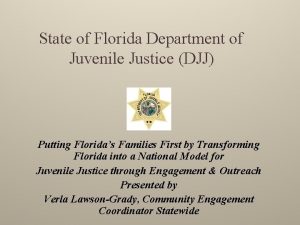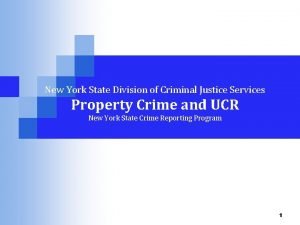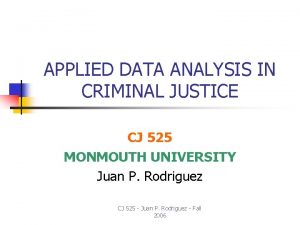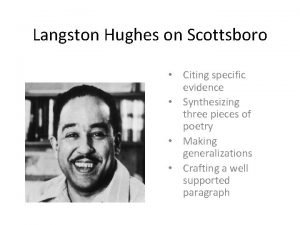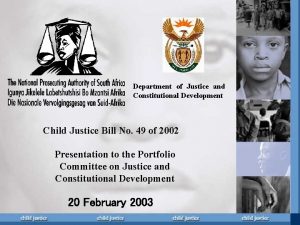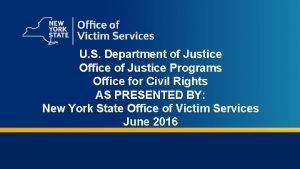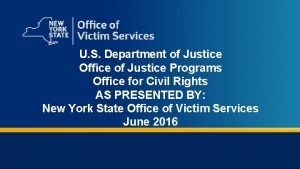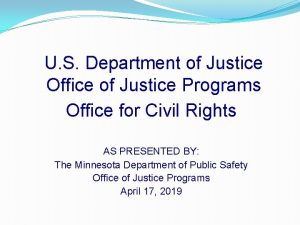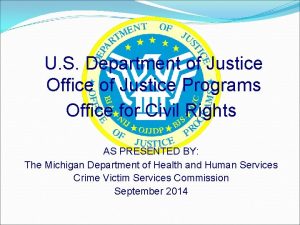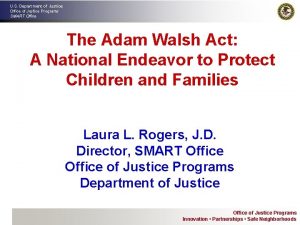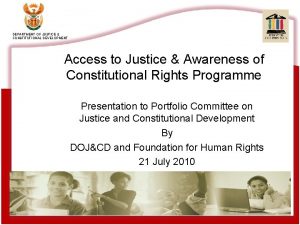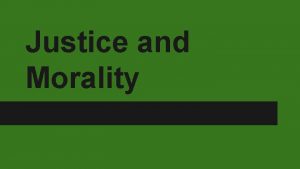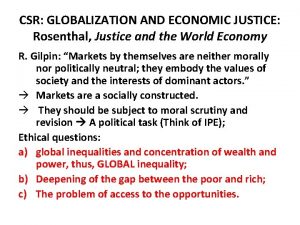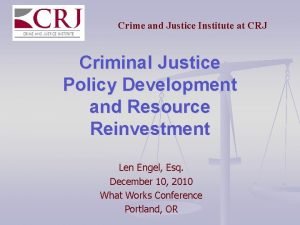DEPARTMENT OF THE ATTORNEYGENERAL AND JUSTICE An analysis




























- Slides: 28

DEPARTMENT OF THE ATTORNEY-GENERAL AND JUSTICE An analysis of the association between criminal behaviour and experience of maltreatment as a child in the Northern Territory For the Australasian Conference for Child Abuse and Neglect (Melbourne, 10 -13 Nov 2013) organised by the Australian Institute of Criminology www. justice. nt. gov. au

Introduction 1. 2. 3. 4. 5. 6. Aims of this research Child protection in the NT Data source and scope Limitations Findings Conclusion DEPARTMENT OF THE ATTORNEY-GENERAL AND JUSTICE

Aims of This Research § To explore the association between maltreatment as a child in the Northern Territory and criminal offending as juveniles and adults. § To determine whethere are differences in the results for sub-populations (eg. Indigenous, non-Indigenous, male and female). § The frequency of repeat offending will also be examined. DEPARTMENT OF THE ATTORNEY-GENERAL AND JUSTICE

Child Protection in the NT In 2011 -12: § § § 7970 child protection notifications 1705 were substantiated 398 children received a child protection order (s) This research examines the subsequent criminal behaviour of children who have received one or more court issued child protection order. Child protection order is used as a proxy for maltreatment in this research. DEPARTMENT OF THE ATTORNEY-GENERAL AND JUSTICE

Data Source and Scope Data Sources: § § IJIS - contains child protection order and conviction records. Birth data – supplied by the Office of Births, Deaths and Marriages. Scope: § § Those who received one or more court issued child protection order; Born between 1985 and 2000; and § Conviction Records 1995 to 30 June 2012. DEPARTMENT OF THE ATTORNEY-GENERAL AND JUSTICE

Data – In scope Population (born between 1985 and 2000) Received one or more protection order Did not receive any protection order Total Female Indigenous 318 (3. 4%) 9, 033 9, 351 Female Non-Indigenous 123 (0. 7%) 17, 018 17, 141 Male Indigenous 247 (2. 5%) 9, 524 9, 771 Male Non-Indigenous 132 (0. 7%) 17, 808 17, 940 Total 820 (1. 5%) 53, 383 54, 203 DEPARTMENT OF THE ATTORNEY-GENERAL AND JUSTICE

Limitations: 1. The level of under-reporting of child maltreatment is not known, particularly in the remote communities of the Northern Territory. 2. The types, severity and frequency of maltreatment were not separately analysed. 3. Other factors that may influence a person’s criminal behaviour such as socio-economic disadvantage, social isolation and disability are not considered in this research. DEPARTMENT OF THE ATTORNEY-GENERAL AND JUSTICE

DEPARTMENT OF THE ATTORNEY-GENERAL AND JUSTICE Findings www. justice. nt. gov. au

Outline Offending • • Juvenile offending Juvenile and adult offending All criminal offences Traffic offences Break-ins and Theft All except traffic related offences Violent offences Repeat Offending/Conviction • All except traffic related offences • Violent crimes Conclusion DEPARTMENT OF THE ATTORNEY-GENERAL AND JUSTICE

DEPARTMENT OF THE ATTORNEY-GENERAL AND JUSTICE Offending

Juvenile Offending* Rate Per 1000 Relevant Population by Indigenous Status and Sex DEPARTMENT OF THE ATTORNEY-GENERAL AND JUSTICE

Offending* Rate Per 1000 Relevant Population by Adult and Juvenile DEPARTMENT OF THE ATTORNEY-GENERAL AND JUSTICE

Age at First Conviction DEPARTMENT OF THE ATTORNEY-GENERAL AND JUSTICE

Offending* Rate Per 1000 Relevant Population by Indigenous Status by Sex: All ANZSOC categories DEPARTMENT OF THE ATTORNEY-GENERAL AND JUSTICE

Offending* Rate Per 1000 Relevant Population: Traffic Related Offences (ANZSOC Division 14) DEPARTMENT OF THE ATTORNEY-GENERAL AND JUSTICE

Offending* Rate Per 1000 Relevant Population: All ANZSOC Categories Except Traffic (Division 14) by Indigenous Status and Sex DEPARTMENT OF THE ATTORNEY-GENERAL AND JUSTICE

Offending* Rate Per 1000 Relevant Population: Break-in and Theft (ANZSOC Division 07 and 08) DEPARTMENT OF THE ATTORNEY-GENERAL AND JUSTICE

Offending* Rate Per 1000 Relevant Population by Indigenous Status and Sex : Violent Crimes (Division 01 to 06) DEPARTMENT OF THE ATTORNEY-GENERAL AND JUSTICE

DEPARTMENT OF THE ATTORNEY-GENERAL AND JUSTICE Repeat Offending/Conviction

Proportion of Repeat Convictions: All Offences Except Traffic Related (ANZSOC Division 14) DEPARTMENT OF THE ATTORNEY-GENERAL AND JUSTICE

Proportion of Repeat Convictions by Indigenous Status: All Offences Except Traffic Related (ANZSOC Division 14) DEPARTMENT OF THE ATTORNEY-GENERAL AND JUSTICE

Proportion of Repeat Convictions: Violent Offences (ANZSOC Division 01 to 06) DEPARTMENT OF THE ATTORNEY-GENERAL AND JUSTICE

Proportion of Repeat Convictions by Indigenous Status: Violent Offences (ANZSOC Division 01 to 06) DEPARTMENT OF THE ATTORNEY-GENERAL AND JUSTICE

DEPARTMENT OF THE ATTORNEY-GENERAL AND JUSTICE Conclusions

Conclusions • Consistent with previous research on this topic, maltreated children in the NT are more likely to offend as a juvenile compared with children for whom there is no evidence of maltreatment. • Maltreated children who did not have a conviction as a juvenile have a much lower likelihood of offending as an adult compared with those who were not maltreated. • Maltreated children have a much lower likelihood of being convicted of a traffic related offences. • Excluding Traffic Related Offences, maltreated children have a higher likelihood of offending overall and all of the sub-populations except Indigenous males. DEPARTMENT OF THE ATTORNEY-GENERAL AND JUSTICE

Conclusions continued • Maltreated non-Indigenous males have a higher offending rate than maltreated Indigenous males for break-in and theft offences. This is an unexpected finding given the offending rate (ABS Record Crime - Offenders 2011 -12) for Indigenous males (12258. 3) in NT is more than seven times higher than the rate for non. Indigenous males (1449. 6) in the general population. • The results of the offending rate for violent crimes are similar to those of all offences excluding traffic. The exception is that maltreated non-Indigenous males have a lower offending rate than maltreated Indigenous males for violent crimes. • Maltreated children are more likely to re-offend than those who were not maltreated overall as well as for all sub-population groups for all offences excluding traffic as well as violent crimes. DEPARTMENT OF THE ATTORNEY-GENERAL AND JUSTICE

Questions ? DEPARTMENT OF THE ATTORNEY-GENERAL AND JUSTICE

DEPARTMENT OF THE ATTORNEY-GENERAL AND JUSTICE www. justice. nt. gov. au
 State of florida department of juvenile justice
State of florida department of juvenile justice Nys division of criminal justice services
Nys division of criminal justice services Us department of justice
Us department of justice Data analysis in criminal justice
Data analysis in criminal justice Scottsboro by langston hughes
Scottsboro by langston hughes Hát kết hợp bộ gõ cơ thể
Hát kết hợp bộ gõ cơ thể Bổ thể
Bổ thể Tỉ lệ cơ thể trẻ em
Tỉ lệ cơ thể trẻ em Chó sói
Chó sói Tư thế worm breton
Tư thế worm breton Alleluia hat len nguoi oi
Alleluia hat len nguoi oi Các môn thể thao bắt đầu bằng tiếng bóng
Các môn thể thao bắt đầu bằng tiếng bóng Thế nào là hệ số cao nhất
Thế nào là hệ số cao nhất Các châu lục và đại dương trên thế giới
Các châu lục và đại dương trên thế giới Công thức tiính động năng
Công thức tiính động năng Trời xanh đây là của chúng ta thể thơ
Trời xanh đây là của chúng ta thể thơ Mật thư anh em như thể tay chân
Mật thư anh em như thể tay chân 101012 bằng
101012 bằng độ dài liên kết
độ dài liên kết Các châu lục và đại dương trên thế giới
Các châu lục và đại dương trên thế giới Thơ thất ngôn tứ tuyệt đường luật
Thơ thất ngôn tứ tuyệt đường luật Quá trình desamine hóa có thể tạo ra
Quá trình desamine hóa có thể tạo ra Một số thể thơ truyền thống
Một số thể thơ truyền thống Cái miệng nó xinh thế
Cái miệng nó xinh thế Vẽ hình chiếu vuông góc của vật thể sau
Vẽ hình chiếu vuông góc của vật thể sau Thế nào là sự mỏi cơ
Thế nào là sự mỏi cơ đặc điểm cơ thể của người tối cổ
đặc điểm cơ thể của người tối cổ Thứ tự các dấu thăng giáng ở hóa biểu
Thứ tự các dấu thăng giáng ở hóa biểu
